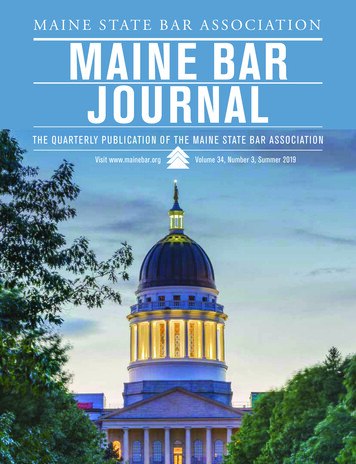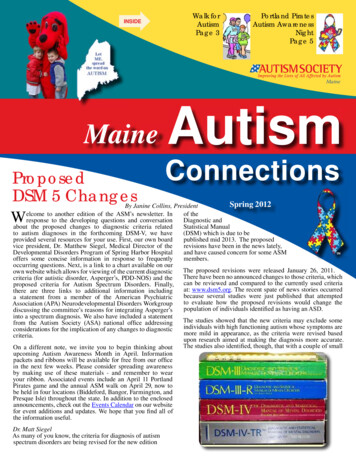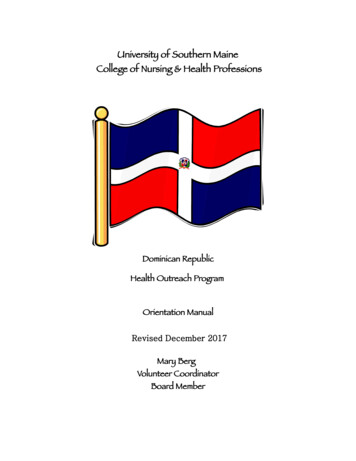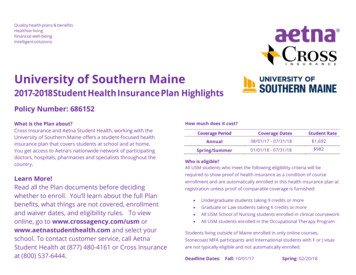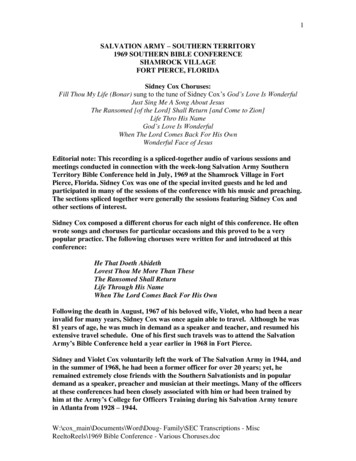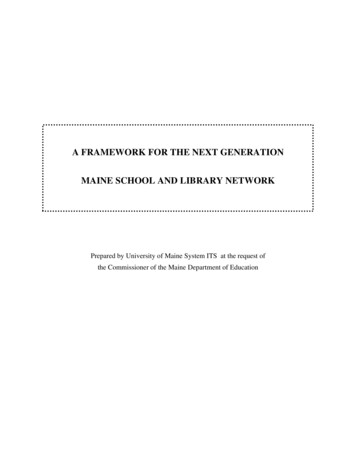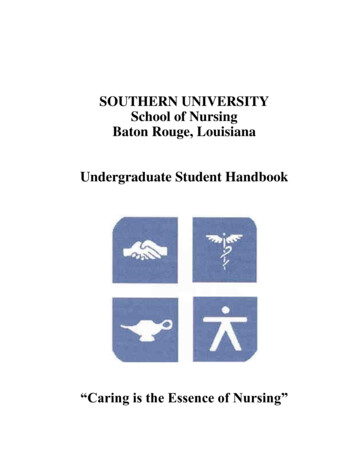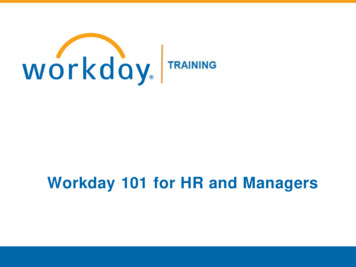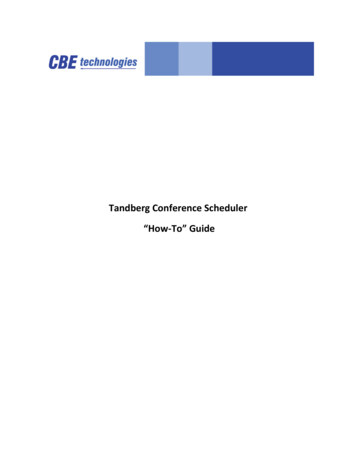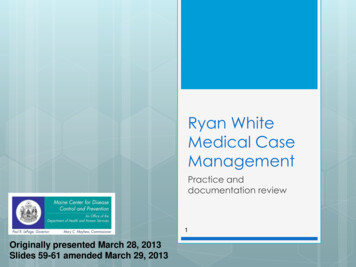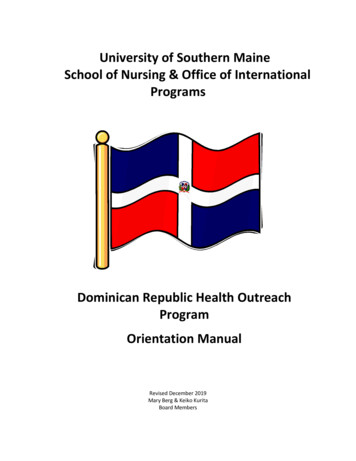
Transcription
University of Southern MaineSchool of Nursing & Office of InternationalProgramsDominican Republic Health OutreachProgramOrientation ManualRevised December 2019Mary Berg & Keiko KuritaBoard Members
Bienvenido!Welcome to the Dominican Republic Health Outreach Program. You are about toembark on a trip that offers many rewards. For students, it is a chance to hone clinicalskills alongside experienced nurses and providers, as well as to experience life and workin a different culture. The project gives volunteers a chance to share their knowledgewith student nurses and to serve people in need; in some cases, patients who have beentreated for years. The perspective you gain may well change the way you think aboutyour own culture. Everyone’s experience will be unique.This manual is meant to help you plan for your trip. It is by no means complete.Please share your suggestions for additions or revisions with faculty.The Project’s HistoryThis project is the result of a meeting between Dr. Anne Keith, then a member ofthe College of Nursing’s faculty, and Dr. John Consoli, a physician who works as a Catholicmissionary, at a restaurant in Santiago. Keith was in the Dominican Republic on a missionorganized by Intercultural Nursing Inc. Their conversation about the area’s health needsturned into a partnership that now spans over 20 years. It began with eight USM nursingstudents and several interpreters traveling to the Dominican Republic in 1995. Theirs wasthe first group to stay at Fusimana, the missionary center that Dr. Consoli and his wife,Jessica, operate in the village of Lajas.That first venture has turned into a twice-a-year program. USM nursing studentsand faculty, along with a host of volunteers, now provide medical care, personal care andhealth education to more than 1500 patients in 20 rural villages. Each day, the team –often made up of as many as 50-70 people – works out of homes, schools or chapels.
They treat injuries, infection, and chronic health problems. They also teach nutrition,dental hygiene, and health education. Students must raise about 4,500 to buy medicalsupplies for each trip.To date, USM’s Dominican Republic Health Outreach Project has served morethan 15,000 patients.Lodging is at Catholic Retreat CenterThe program is headquartered at a Catholic retreat center in Lajas, called Fusimaña.Fusimaña is located in the mountains on the border between the Puerto Plata Provinceand Santiago Province, 32.4 miles south of Puerto Plata Airport. It is about an hourdrive to Puerto Plata. While at Fusimaña you are asked to respect the religious natureof the center. Someone may say grace before the evening meal. Mass is offered weeklyat a nearby church and occasionally at Fusimaña, though you are not required to attend.Our village clinics serve people of all faiths. Church leaders are accountable for theresults of our work, and we respect their guidance and culture at all times. We use themodel of promoting public health in faith communities.Do I have to speak Spanish?No, although it’s certainly a great advantage. Interpreters from the United States and theDominican Republic participate on the trip, so it is possible to go without knowing thelanguage. However, we strongly recommend you learn some Spanish before the trip.Knowing some Spanish words and phrases can make a difference when working withpatients and interacting with drivers and Fusimaña staff. There are Haitian communitieswithin many of the villages that we visit, so there some patients that speak Creole andFrench.Learning SpanishFor those in the Portland area, The Language Exchange offers Spanish classes atvarious levels, including private and semi-private /info/SpanishAn Introduction to Spanish for Health Care Workers: Communication and Culture, FourthEdition, by Robert O. Chase and Clarisa B. Medina de Chase (Yale University Press) is aterrific book written by two health care workers, one of them Dominican-American, thatincludes online audio and video resources. yalebooks.com/medicalspanishISBN: 9780300212976McGraw-Hill Education Complete Medical Spanish: Practical Medical Spanish for Quickand Confident Communication, Third Edition (2015) by Joanna Rios, Jose FernandezTorres, and Tamara Rios. ISBN-13:9780071841887
Duolingo, Learn Spanish for free via an App on your phone. https://www.duolingo.com/Active ParticipationThis is a demanding work experience. You will find yourself lifting box, climbing in andout of vehicles, walking over various types of terrain, and working 10-hour days. Werecommend that you walk one to two miles each day at least a month prior to the trip. Amedical history, physical exam performed and signed from a provider, and emergencycontact form is required by USM/PRHDR. Please include any physical limitations.Preparing for the TripOrientationThere will be an Orientation at USM prior to the trip for volunteers and students.Volunteers are highly encouraged to attend orientation to meet the students, othervolunteers, and USM staff. There will be presentations on safety in the DominicanRepublic and packing for the trip, as well as packing of medical equipment.PassportYou need a passport that is not expired. Non-U.S. citizens must also have currentdocuments, and some will need a special visa from the Dominican Consulate in Boston.PRHDR will need a copy of the photo page of your passport.Get Your Passport ASAP!For the most up-to-date information as well as all the appropriateforms, visit the U.S. Department of State’s website at travel.state.gov.Routine processing time for a passport is six to eight weeks, start theprocess now.In a nutshell, if you’re applying for a passport for the first time, you’llneed to appear in person at a passport processing center, typically a post office orcourthouse (you can search for them by zip code at the State Department website). You’llhave to bring photographs of yourself that meet passport requirements; you can have ittaken at places like a Fed Ex Office, Wal-Mart, or even some post offices for a nominalfee. You’ll also need to bring proof of U.S. citizenship, such as an original birth certificate,not a photocopy, and a valid form of photo identification, such as a driver’s license. As ofNovember 2019, a first-time passport costs 145, payable by credit card, check, or cash.Routine processing time for a passport is six to eight weeks. Expedited service isavailable and takes approximately two to three weeks, but you’ll pay about 60 extra plusthe cost of shipping.
If you have a passport that has expired, you can renew it by mail or online provided itwas issued within the last 15 years. Details are at travel.state.gov.What immunizations do I need?The College of Nursing requires that you follow recommendations issued by the Centersfor Disease Control. That means that you must be up to date on the following: Diphtheria-tetanus (with pertussis if booster is due)Typhoid (either oral live vaccine or killed injectable vaccineHepatitis A (the USM Campus Health Centers offer an inexpensive vaccine)Hepatitis B (series of three with new option if departure is soon)Polio and MMR (if you had this as a child long ago, a booster is recommended)Tuberculosis screening within one year (recommended.)Malaria prophylaxis should be considered based on CDC recommendations, though wehave seen no cases in our area of the Dominican Republic. Malaria is sensitive tochloroquine in the DR. Dengue viral fever, Chikungunya fever and Zika virus have beenreported in DR. DEET insect repellent and cover-up clothing can reduce your exposure.For more information, read the CDC’s advisories for travelers at www.cdc.gov/travel/.You should allow at least two months to complete the required immunizations. The USMCampus Health Center located in Gorham offers a travel clinic. For more information, callUSM Health Services 207-780-5411.Call the City of Portland Public Health, which offers an excellent vaccine service as wellas tuberculosis skin tests through its Infectious Disease Program at 103 India St. Thisservice is open to everyone, regardless of residence, though an appointment is required.Call 207-874-8446 for an appointment or up-to-date information on fees.Other Travel Medicine Clinics in Maine can be found at Maine.gov.Do I need to carry special health insurance?Yes. You must have coverage specifically for health care and medical evacuation abroad.If you are injured, it is important to have a means to secure safe and reliable medical careand transport home. You will be exposed to tropical diseases and the potential foraccidents, as is always true when traveling in third world countries.Volunteers are asked to have current health coverage. The Volunteer Fee coversemergency evacuation through On Call International.PackingWhat should I bring?
Here’s the short answer: not nearly as much as you might think. The lighter you pack,the more comfortable you and your roommate(s) will be in your room – and the moremedical supplies you can carry when you board the plane. It’s a good idea to talk withyour roommate first to decide who will bring what. You might also want to pack your bagswith the idea that you’ll leave behind some items when you leave, such as bedding orshoes that are in good shape, toiletries, bugspray, and unopened snack foods. Anythingwe leave behind is gratefully accepted by the Peace Corps volunteers who serve as ourinterpreters, as well as the Fusimaña staff.Three days’ worth of clothes, max. You’ll need suitable clothes forworking in the clinics (more on the dress code to follow). One of the perksof Fusimaña is the terrific laundry service provided by the center’s staff.Make sure you’ve labeled your clothes. The staff will do all of the washand have it back to you within two days, often within 24 hours They doask that you wash your own underwear, so you might want to bring a small bottle of coldwater detergent and a universal stopper for scrubbing in the sink. (By the way, gratuitiesfor the staff are included in the fees you pay.)Packing List:Personal Items Make sure you pack a 10 bill Backpack to take personal items to clinic.Fanny pack or small bag that can be on your body at all times for passport,money, etc.Passport (must carry on you at all times in case of emergency evacuation).Copy of your Health Insurance Card and passportCamera with memory card and batteries (there is electricity to charge batteries,but sporadic)Two water bottlesZiploc bags for personal useHand Sanitizer (for your daypack/fanny pack or your room)Towels and washcloth (your laundry is done for you so you may want 2 of eachso you don’t go without waiting for yours to return)Underwear, socks, night wear (it can be cool)Sneakers, and perhaps hiking boots for home visits, and/or comfortable sandals.It can rain so prepare with footwear appropriate for walking on muddy groundand being wet.Swimsuit (Beach Day attire)Flip-flops to wear in the shower3 scrubs (You are only required to wear a minimum of one scrub article eachclinic day, but full scrubs are great too, not to mention very professional)
3 sets of casual clothing when not in clinic. This includes t-shirts, modest tanktops, shorts, capris, sundresses, skirts, one “fun” outfit for party night.Light fleece and/or fleece vest is recommended as the evenings in the winter canbe cool (60’s oF).Poncho, umbrella and/or pocket-size raincoat (expect some rain, guaranteed)Note: pack umbrella in your check in bag, they are not allowed in your carry-onToothbrush, Brush/Comb (leave hair dryers at home – you often won’t haveelectricity, anyway)Tampons, sanitary pads, razorsSunglasses & hatRoll of Duct TapeEar plugs (roosters and neighbors can be quite loud at night with concrete walls.)Flashlight and batteries (preferably head lamp for clinics and to get around atnight)Clipboard & several pens for your assessmentsSnacks (such as energy bars, crackers, dried fruits, candy, cans of tuna – thoughdon’t forget a can opener and mayo packets)Coordinate with your roommate for items that can be shared. Insect repellent (preferably w/DEET) for your skin – essential!Insect spray for ants, roaches and bed bugsToothpasteSunscreenAlarm clockShampoo & Soap or Body Wash (unscented if you’d like to deter mosquitos)Command hooks and Para cords may be useful for managing your mosquitonetting and other things in your room.Deck of Cards/Travel Games/Cribbage (you will have down time at night)Bathmats/towel (showers can leak – these will help keep your floor clean)Optional Battery Operated FanThin sleeping bag/light blanket, and pillow (a compressible down one is greatbecause the pillows tend to be very thin there)Stethoscope (not required, but you may want your own. Clinics can get loud andnot all of our stethoscopes are of the highest quality)Solar Water Bag (if you require hot showers)Books, JournalBubbles, Connect the dots, Stickers, Baseballs, Colored pencils, markers. (Thisis Optional - it’s not possible to bring enough treats for all the children you’ll seebut if you’re feeling generous and would like to bring something, you’re morethan welcome. Anticipate between 20-30 children in a given village)
What do I need to work in the clinics?Medical professional students, staff and volunteers:You must wear a scrub top and/or scrub bottom while at clinic. Amodest, plain shirt with no writing, or a t-shirt (PRHDR shirts are perfect) as your otherarticle of clothing on clinic days. You should look like a medical professional. Pants orcapris, NO shorts at clinic. Watch with a second hand. Bringing your own stethoscope isoptional but recommended due to limited quality stethoscopes. A head lamp is helpful forclinical assessments as well as getting around at night. You’ll need hand sanitizer forfrequent use at the clinic, so you might want to buy it in a container that can be clippedon to your fanny pack. Be sure to bring pens and a clipboard. Water bottle. Snacks.Non- medical staff and volunteers:A modest, plain shirt with no writing, or a t-shirt (PRHDR shirts are perfect) as your otherarticle of clothing on clinic days. Pants or capris, NO shorts at clinic. Bring a shirt with acollar for some occasions. Dressing modestly and neatly shows respect for the clientswith whom you will be interacting. Hand sanitizer. Water bottle. Snacks.What about when I’m off duty?Modest shorts, T-shirts, thick strapped tank tops, modest sun dresses. You will berelaxing on the grounds at Fusimaña. There will always be local people present and theylook to us as professional role models. Reading, journaling, card and board games,jogging, walking the grounds, chatting with your mission members are all part of themission. Always remember to repack the bins you are assigned to for the next clinic day.Should I pack any food?Yes. You’ll want to pack snacks as shopping is very limited in Lajas, and our meals willinclude frequent beans and rice. Two suggestions: Pack all food in Ziploc bags unless youenjoy visits from bugs and rodents. Don’t pack anything with a lot of chocolate in it unlessyou enjoy melted chocolate. You might want to pack small cans/packages of tuna fish orpotted meats, peanut butter and crackers, energy bars, cereal, candy, dried fruit or trailmix. Bring high-fiber cereals if you need this in your diet. Can opener and mayo packetsare handy.How much luggage can I take?You can take two pieces of carry one items, one carry-on piece of luggage and onesmaller personal bag/backpack. Your checked bag must weigh less than 50 pounds each.This bag will be a large duffel bag packed with medical supplies; this bag will be suppliedby USM. There will be ample room and consideration for you to pack some of your ownpersonal items. Not everyone will have a medical bag. You should pack two days’ worthof clothing in your carry-on bag (in case your luggage is delayed or lost), as well as anysupplies or medications you may need. Luggage is sometimes delayed. For the latest
packing regulations, visit the Transportation Security Administration’s website atwww.tsa.gov.Medical SuppliesAll medications are purchased in the Dominican Republic.You may request donations of miscellaneous supplies from local churches, pharmacies,doctors’ offices, and hospitals. You may also request cash donations from organizationsand members of your community. Some members will receive more donations than theycan carry, while others will not receive as many. At our orientation we will organize thesupplies so that everyone will have a fairly equal amount to take with them. Eachvolunteer is strongly encouraged to raise approximately 300 in order to provide themedications and supplies needed.Miscellaneous supplies in need include non-latex gloves, 4-by-4 sponges, kerlexbandages, wound and ulcer care materials, cast shoes, ortho supplies such as soft supportknee braces, wrist splints, hand splints, muscle rubs, walkers, wheelchairs, cushions,crutches and reading glasses.We also need supplies to perform lab tests for pregnancy, urine leukocytes. Glucometersare accepted if they have at least 25 strips and are a standard type. We urgently needlarge supplies of strips with matching meters. Please consult with the team beforebringing.What to Review before the Trip*Physical assessment skills, especially chest, skin, and children's ears.*Dermatology, especially fungal diseases, scabies, infections, and leg ulcer care.*Formulary of medications used in clinic. Volunteers, contact VolunteerCoordinator for a list.*Treatment of intestinal parasite infections (pinworms and ascaris)“Helping Health Workers Learn,” by David Lerner. Available in bookstores or amazon isstrongly recommended.
At Last, Fusimana!What happens when we arrive at the airport?We fly into Santiago. A tourist card for 10 which is valid for 30 days willneed to be purchased. **make sure you pack a 10 bill**. Next we collectluggage and pass through customs. You will complete an application forentry into the country. When asked to list your reason for entering the country, mark“pleasure.” Everyone helps to move all of the baggage, and you will be responsible foryour own luggage, including the medical bag assigned to you. We will pack the luggageinto trucks and drive in a private bus about an hour from the airport to Lajas, the villagethat is home to Fusimana. Be sure to take care of toileting needs before you leave theairport. Roads are bumpy. No stops.What is Fusimana?Fusimana is a Catholic mission retreat center for prayer. There are triple rooms withbathrooms, including flush toilets, sink and showers. Be prepared for numerous littlebreakdowns. Use only bottled water to brush your teeth. You can refill your water bottlesfrom 5-gallon water jugs in the dining hall. Please help refill water jugs. Do not put anypaper in the toilet. You’ll be given plastic bags for disposal. Plumbing is very fragile!What will we typically eat?Breakfast: bread, ham and cheese, hot cereal, coffee, fruit, cold cerealwith boxed milk, or eggs.Lunch: Making peanut butter and jelly or cheese sandwiches for yourselfis done after breakfast and you carry your own. Fruit juice will beavailable.Dinner: rice and beans, chicken soup, cabbage salad, fried chicken orstewed meat, eggs, fresh local fruits and vegetables, fruit juice.What if I am a vegetarian?Many vegetarians have successfully completed the trip. However, it is important to beflexible. The beans may be prepared with some meat broth, but they do not have anychunks of meat. The food is served buffet-style so that you will be able to pick andchoose. Vegans will not have any problem as few foods are prepared with dairy products.Will I have a roommate?Yes. At Fusimana the rooms are mostly triples, with metal bunk beds. If you have aroommate in mind, your request will be honored as much as possible. If you do not have
a roommate, talk with faculty or volunteer coordinator. They can help y
It began with eight USM nursing students and several interpreters traveling to the Dominican Republic in 1995. Theirs was the first group to stay at Fusimana, the missionary center that Dr. Consoli and his wife, Jessica, operate in the village of Lajas. That first venture has turned into a tw
